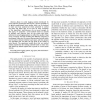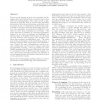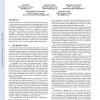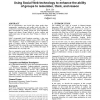HT
2010
ACM
14 years 5 months ago
2010
ACM
While recent research has advanced our understanding about the structure and dynamics of social tagging systems, we know little about (i) the underlying motivations for tagging (w...
ASUNAM
2009
IEEE
14 years 5 months ago
2009
IEEE
—Spam in social tagging systems introduced by some malicious participants has become a serious problem for its global popularizing. Some studies which can be deduced to static us...
ESWS
2007
Springer
14 years 6 months ago
2007
Springer
While tags in collaborative tagging systems serve primarily an indexing purpose, facilitating search and navigation of resources, the use of the same tags by more than one individu...
CIKM
2009
Springer
14 years 7 months ago
2009
Springer
Social tagging systems have recently emerged as an effective way for users to annotate and organize large collections of resources on the Web. Moreover, they also facilitate an e...
ADC
2009
Springer
14 years 7 months ago
2009
Springer
Tags in social tagging systems store meaning for the taggers who have entered them, and other users often share this understanding. The result of this, a folksonomy, is typically ...
EDBT
2010
ACM
14 years 7 months ago
2010
ACM
This paper presents P3Q, a fully decentralized gossip-based protocol to personalize query processing in social tagging systems. P3Q dynamically associates each user with social ac...
WISE
2009
Springer
14 years 9 months ago
2009
Springer
Abstract. Under Social Tagging Systems, a typical Web 2.0 application, users label digital data sources by using freely chosen textual descriptions (tags). Mining tag information r...
106
click to vote
SIGMOD
2009
ACM
15 years 20 days ago
2009
ACM
We are experiencing a new Social Web, where people share, communicate, commiserate, and conflict with each other. As evidenced by systems like Wikipedia, twitter, and delicious.co...
WWW
2008
ACM
15 years 1 months ago
2008
ACM
We present the design of Plurality,1 an interactive tagging system. Plurality's modular architecture allows users to automatically generate high-quality tags over Web content...




